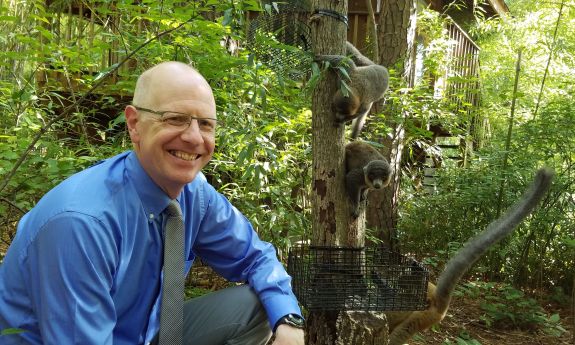Greg Dye Reappointed to Second Term as Executive Director of the Duke Lemur Center

“The review committee found that Greg has extraordinarily deep knowledge about the operations of the DLC,” said Alberts. “He is an extremely capable manager of resources, infrastructure and staff.”
Duke’s provost conducts regular reviews of all deans, vice provosts, senior staff and faculty who have major administrative positions reporting to the provost. The review committee was announced on Duke Today on April 4 and invited comments from the Duke community.
Dye joined the Duke Lemur Center in 2008 and has served as executive director since July 2019. He received the Duke University Presidential Award in 2017. As executive director, Dye oversees the DLC and leads its tripartite mission of noninvasive research, education and conservation of lemur habitats in Madagascar.
Established in 1966, the Duke Lemur Center now houses more than 200 lemurs and bush babies across 13 species -- the most diverse population of lemurs on Earth, outside their native Madagascar.
Over Dye’s tenure, published scientific papers related to the Lemur Center have represented a broad range of disciplines including evolutionary biology, evolutionary anthropology, ecology, biodiversity conservation, genetics, animal behavior, and microbiology. In addition, the DLC Museum of Natural History has become an important fossil repository, with more than 35,000 fossils.
The DLC is open to the public and welcomes more than 35,000 visitors annually for tours and educational programs. Its highly successful conservation breeding program seeks to preserve endangered species.
Under Dye’s leadership, the Association for Assessment and Accreditation of Laboratory Animal Care International, the major accrediting body for laboratory animal care, has recognized the DLC for innovation and excellence.